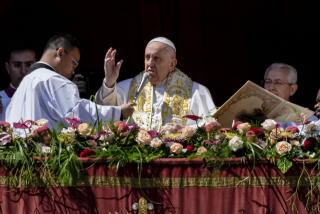Pope Seeks End to Old Grudge in Christianity : Religion: John Paul II asks and offers forgiveness for long-ago wars between Catholics and Protestants.
- Share via
OLOMOUC, Czech Republic — Pope John Paul II peered across a horizon of mud and umbrellas Sunday with his gaze fixed on the bloody religious history of Eastern Europe.
Beyond the chilled crowd of pilgrims, the Pope pictured Roman Catholic and Protestant armies hurtling through mangled crops and devastated villages, killing for about two centuries in the name of God. Then, speaking with the full authority of his station, the Pope solemnly proposed an overdue peace treaty between discordant Christians.
“Today I, the Pope of the church of Rome, in the name of all Catholics, ask forgiveness for the wrongs inflicted on non-Catholics during the turbulent history of these peoples. At the same time, I pledge the Catholic Church’s forgiveness for whatever harm her sons and daughters suffered,” he said.
Religious divisions, typified by discord over the Pope’s canonization Sunday of a controversial Catholic priest, persist today in Czech lands that were the site of a series of wars from the 15th to 17th centuries between Protestant Bohemian princes and Catholics supporting the Vienna-based Hapsburgs.
John Paul called for “a new beginning in the common effort to follow Christ” in “this land where in the past Christians have fought violently for religious reasons.”
“We forgive and we ask forgiveness,” John Paul said at a hillside sanctuary outside this melancholic city in Moravia, which was a battleground of the ferocious Thirty Years’ War in the 17th Century.
The papal initiative is part of his campaign to draw religions and cultures together to celebrate the start of the third millennium of Christianity in the year 2000. On a trip to Africa in 1992, he apologized for the church’s role in the slave trade, and in Latin America that same year he apologized for the Catholic hand behind the exploitation of Native Americans.
Speaking to Protestants on Sunday, John Paul expressed his church’s “profound regret for the weakness of so many of her sons and daughters who sullied her face.”
For Czech Protestants, Jan Sarkander, the 17th-Century priest raised to sainthood Sunday, is a hard sell. They see him as a symbol of the violent reimposition of Catholicism in Czech lands during the Thirty Years’ War.
Pavel Smetana, the country’s senior Protestant leader, boycotted an ecumenical meeting with John Paul in Prague on Saturday after failing to halt the canonization of the hard-line priest. Smetana and others have argued that the canonization insults the memory of Protestants who died during the Counter-Reformation.
“It can only aggravate the wounded soul of the [Protestant] Church and Czech populace, which is still bleeding,” Smetana said in a letter to the Vatican last month trying to short-circuit the canonization.
Born in Skoczow, a city now part of Poland, Sarkander was tortured to death here in 1620 at age 46. Catholics reverently display behind glass here the rack that stretched him.
Protestants accused Sarkander of treason for helping an invading Catholic army from his native country; they say he acted for political, not religious, reasons. Not so, said Pope Pius IX in 1860. The pontiff beatified Sarkander after concluding that he was martyred for his faith.
Discomfited by protests against Sarkander, the Vatican hurriedly added a second canonization to John Paul’s Sunday list to soften the impact. Thus did Zdislava of Lemberk, the good-works wife of a 13th-Century nobleman, join the church’s list of saints Sunday 88 years after she was beatified by Pope Pius X.
More to Read
Sign up for Essential California
The most important California stories and recommendations in your inbox every morning.
You may occasionally receive promotional content from the Los Angeles Times.













